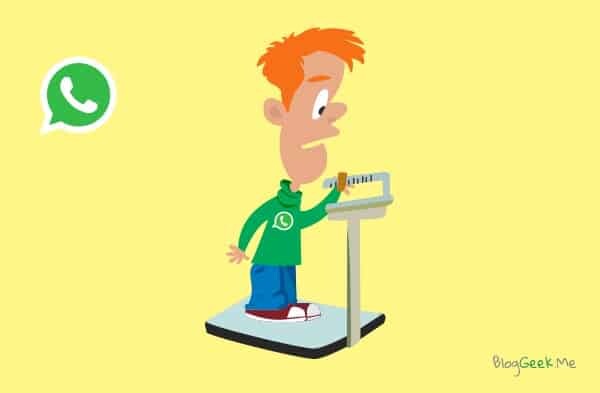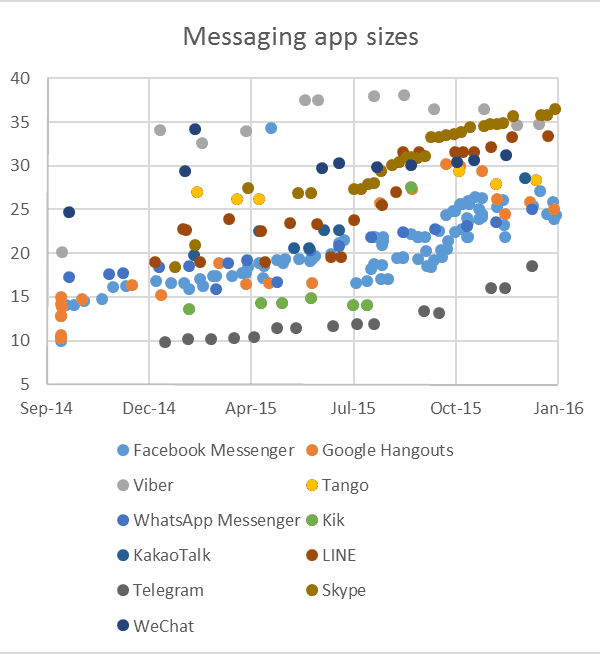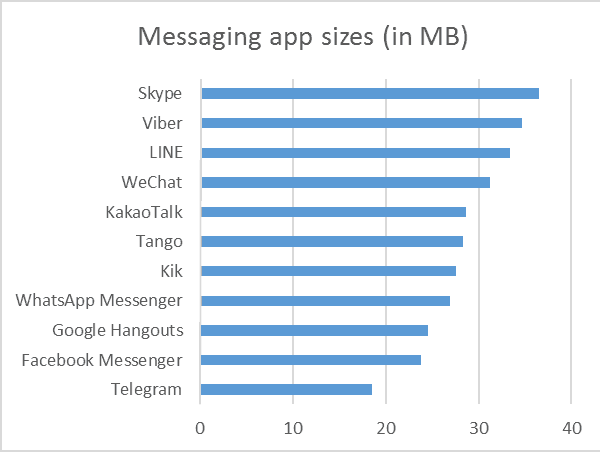Not too big, but not small either.
Here’s a shocker – Facebook Messenger has been updated 19 times on Android in 2016. WhatsApp has had 25 releases in the same time span. And we’re not even in the middle of February.
We are talking about the two messaging applications with the largest number of monthly active users, with WhatsApp surpassing the one billion milestone. gulp.

To deliver an app that weighs 26 MB to a billion people (I am thinking WhatsApp here), you end up sending over 23 petabytes of data (translation: a shitload of bits). Doing that 25 times since January 1st…
I took a stab at looking into the consumer messaging apps (some of the enterprise ones are larger, though less frequently updated). Here’s what I found:
#1 – They are all fattening up

The scatter graph above is a bit scattered, but it is easy to see that most apps are increasing in size over time. Since September 2014 until January 2016. They all migrated from the 10-20 MB sizes into the 20-40 MB sizes. That’s a doubling in their weight in less than two years.
We don’t think about it much, but we’re in a serious need of a diet here:
- This loads our networks. Not as much as video traffic, but still significant
- Most users have more than one such app on their phone
- These apps update frequently
- It adds up
- With WhatsApp reaching the one billion mark, where will it be headed next?
- To maintain its growth it needs to search for additional users
- These need to come from developing countries
- And there, bandwidth and data is scarce
- The smaller the app, the easier it is on users to handle
- Most of the messaging apps don’t seem to care about how fat they are
#2 – Size doesn’t equate feature richness

The bar chart above shows how big the latest version of each of these messaging apps is.
Te results are rater surprising:
- Skype is the bloated of them all at this point in time, but I don’t remember anything new or interesting that Skype on Mobile introduced in the last two years. And yet – it managed to double its size
- Those in the vicinity of one billion users/downloads are trying to stay on the skinny size – Facebook Messenger, WhatsApp and Hangouts are all rather small compared to the rest of the pack – and somehow, Facebook Messenger is even smaller than WhatsApp (I’d expect it to be the opposite)
- WeChat and LINE, which can be seen as e-commerce platforms are larger than most, but somehow Skype and Viber manged to be even bigger
–
I wonder when a diet will be called for. And maybe it already is.

Don’t the app stores incur the bandwidth expenditures and not app publishers?
Yes, but so do the users who end up downloading these apps.
I update the mobile apps when I am connected to WiFi. So for me the size of apps (including the messengers) is not about the bandwidth but about the phone memory size.
The bigger the app the harder it is to manage throughout the whole value chain – it is harder for the app stores to send to devices, it is hard on devices to download and install.
For those with the newest phones with free WiFi connections and large data plans that might not be an issue, but if you look at over half of the world’s population, they are just not there. Messaging is headed towards that part of the users base now, and messaging apps will need to go on a diet to fit well to that market.
I don’t see the point of this article.
Most of those apps are updated automatically, at idle time using WiFi.
I don’t know what are you trying to say.
Skype bloats by itself with new updates. I recently uninstalled it on a Galaxy 8550. It had eaten up 1Gb of space by itself. Just now I again uninstalled it on my Samsung Tablet where already it had grown to 448 mb. THAT’S the big question: why do updates make it grow and grow? After a couple of months it eats up valuable mobile memory space. Check your apps and see if you have the same problem…
My Messenger app for Facebook is more than 260 MB on iphone…